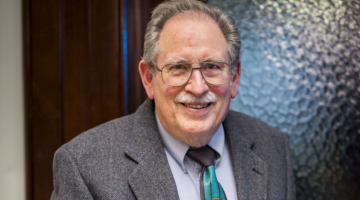While many established lawyers are on or gearing up for vacation (as I noted last week), aspiring lawyers at most top law schools are quite busy with On-Campus Interviewing (OCI), and interviewing with large firms and boutiques looking to bring in next year’s class of summer associates. While most OCI interviews are conducted by Biglaw firms, there are also smaller firms that participate formally in the OCI process — usually practice-focused boutiques or smaller general-practice regional firms.
At the same time, smaller firms that do not participate are also often interested in bringing on summer help, and while their interview process may be less formalized, the interest in bringing on the most promising candidates available remains the same for any firm that aspires to a sophisticated practice for sophisticated clients. Fortunately for our firm, for each of the past two summers (our first two summers as a firm, for that matter) we have welcomed very promising talent for a summer internship. Thankfully for our summer interns, their experience with our firm has not stood in the way of them attracting substantial interest during OCI from leading firms, and we are sure they will be or have been a credit to whatever Biglaw firm welcomes them on for their respective 2L summers.
As an initial matter, it is important to note that OCI interviews are very much unlike the interviews that experienced lawyers endure when looking for employment. Perhaps very junior associates experience something close to an OCI interview during their first attempt to lateral, but even they will at least be asked to provide some information on what they have done, for what type of clients, during their first full period of employment. In contrast, there is no expectation during OCI that the interviewee has any marketable legal skills at all, even for those who worked as paralegals or the like prior to going to law school. When someone is chosen for an OCI interview, absent some sort of favor for a partner or client, it is usually on the strength of their potential — as expressed by the prestige of the law school they are attending. For some schools and firms, first-year grades and selection for a journal are also relevant criteria. Accordingly, OCI interviews tend to be forward- rather than backward-looking, focused on sussing out whether the interviewee would be a good “fit” in the summer associate class being assembled by the firm.

Litera One, Gen AI, And The Future Of Legal Tech
Litera CEO Avaneesh Marwaha weighs in on the company’s new solutions and how they’re changing the Biglaw workflow at Legalweek.
To be honest, long-term considerations such as the ability to make partner are really irrelevant when it comes to evaluating legal talent at such a nascent stage of development. It is much more important to a firm to bring on summer associates who reflect well on the firm (and the recruiting department) internally and externally, while reducing the risk of embarrassment to the firm as much as possible. Considering the hard cost of maintaining a summer associate program, or even bringing aboard a single summer associate for a small firm, there is little interest at firms of any size in seeing any trouble from a summer hire — especially when it is nigh impossible to actually recoup some of the expense of the summer program by billing clients for the summer associate’s “work.”
Understanding this “psychology” can be very helpful for those interviewees fortunate enough to have the opportunity to interview with a firm for a summer position. To make it even simpler, there was a recent article (on the always illuminating, ATL-contributing AdamSmithEsq.com) that highlighted “skepticism” as a trait exhibited by many lawyers. How does that trait translate to the OCI process? Simple. It is best to approach your interviews with humility, graciousness, and sincerity. Because no matter how wonderful your credentials, your interviewer will be looking at you with a skeptical bent, since they have seen colleagues, and perhaps friends, flame out of legal practice with even better credentials. And you can bet that your ability to ever generate business, and actually bring revenue into the firm, will be viewed with even more skepticism (even if you were the number-one smoothie salesman at your local franchise while in college).
At the same time, the saving grace for OCI interviewees is that your interviewer is not interested in getting to know you too deeply. In fact, they are not really interested in learning anything about you, other than making sure that you are not a bearer of one of the manifold blemishes that spell doom for a legal career. Know that the list of blemishes that can lead to disqualification will be an idiosyncratic one, so there is no sense in fretting too much about trying to game your interviewer. Better to play the odds, and be at least slightly knowledgeable about what the firm you are interviewing actually does, while being comfortable communicating why you are a nice, hard-working future associate who happens to be normal and easy to get along with. When in doubt, let the interviewer talk, and if necessary get them started by asking a bland open-ended question. Lawyers are great at discussing the topic of “themselves,” and before you know it your interview will be over — and your interviewer will probably recommend you for a callback since they remember you as “pleasant” and “interested in the firm.”
At bottom, interviewing for a summer associate position is the first of many opportunities that young lawyers have to make themselves useful to future employers. Understanding what employers are really looking for in summer associates is critical to making the necessary impression to get hired in this difficult market. If anyone has specific questions, I would be happy to answer them, but the key to navigating OCI is ultimately about being as prepared as possible for your interviews, having a sense of what you want to communicate about yourself during those interviews, and acknowledging that you need the entryway into the profession more than the profession needs you at this stage of your legal career. Finally, recognize OCI for something else as well: the one time in your career where you will meet with many firms in a short period of time, and a great opportunity to start thinking about whether working in a firm, big or small, is right for you.

A Career In Legal Services: Practising Law Institute Honors Toby J. Rothschild
PLI honors Toby J. Rothschild with its inaugural Victor J. Rubino Award for Excellence in Pro Bono Training, recognizing his dedication and impact.
Gaston Kroub lives in Brooklyn and is a founding partner of Kroub, Silbersher & Kolmykov PLLC, an intellectual property litigation boutique. The firm’s practice focuses on intellectual property litigation and related counseling, with a strong focus on patent matters. You can reach him at [email protected] or follow him on Twitter: @gkroub.